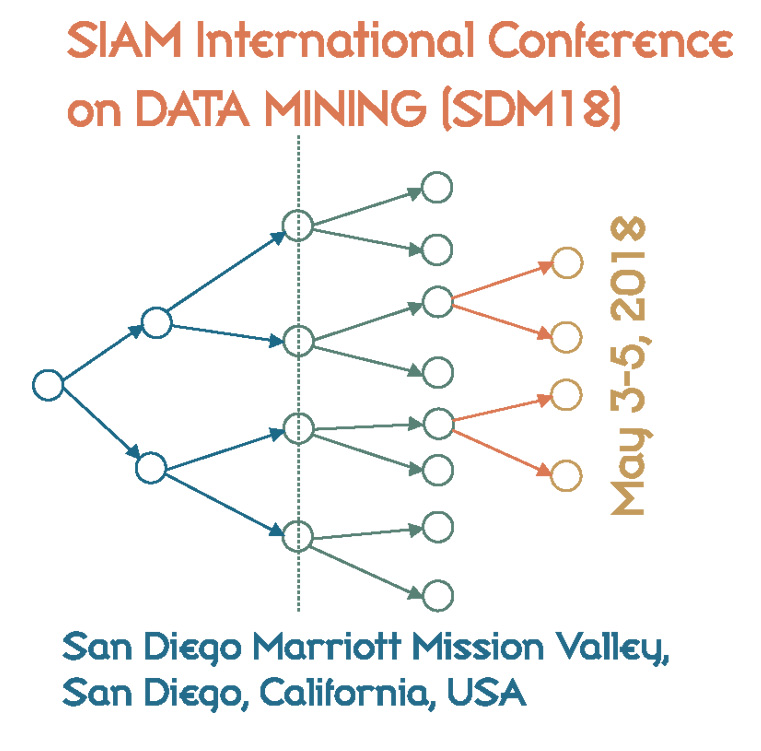MLRec 2018
4th International Workshop on Machine Learning Methods for Recommender Systems
In conjunction with 18th SIAM International Conference on Data Mining (SDM 2018)
May 3 - 5, 2018, San Diego, CA, USA
Following the success of the several editions of MLRec in
2015,
2016,
2017,
the fourth edition of the MLRec workshop focuses on developing novel, and applying existing
Machine Learning (ML) and Data Mining (DM) methods to improve recommender systems.
This workshop also highly encourages applying ML-based recommendation
algorithms in novel application domains (e.g., precision medicine), deep learning for recommendation, and
solving novel recommendation problems formulated from industry.
The ultimate goal of the MLRec workshop series is to promote the advancement and implementation of
new, effective and efficient ML and DM techniques with high translational potential
for real and large-scale recommender systems,
and to expand the territory of ML-based recommender system research toward non-conventional
application areas where recommendation problems largely exist but haven't been fully
recognized.
Topics of Interest
We encourage submissions on a variety of topics, including but not limited to:
Submission
Instructions
The workshop accepts long paper and short (demo/poster) papers. Short papers submitted to this workshop should be limited to 4 pages while long papers should be limited to 8 pages. All papers should be formatted using the SIAM SODA macro. Authors are required to submit their papers electronically in PDF format to the submission site by 11:59pm MDT, Jan 15, 2018. The site has started to accept manuscripts. At least one author of each accepted paper should be registered to the conference.
Important Dates
- Paper Submission Deadline:
December 23Jan 15, 2018 - Author Notification: January 23, 2018
- Camera Ready Paper Due: February 1, 2018
- Workshop: May 5, 2018
Invited Speakers
 Martin Ester, Professor, Simon Fraser University
Martin Ester, Professor, Simon Fraser University
Title: Recommendation in Social Media
Abstract: Social media are media for social interaction, using highly accessible and
scalable communication techniques to create and exchange user-generated content. In
the social sciences, the effects of social influence, homophily or selection, and
transitivity have been identified as drivers of the dynamics of social networks. In the first
part of the talk we will present a matrix factorization approach to incorporate these
effects into a recommender system by regularizing the user factors with the user factors
of direct friends. In the second part, we will discuss how to exploit product reviews, a
popular type of user-generated content, to improve the accuracy of recommendations.
Our approach combines probabilistic matrix factorization with aspect-based opinion
mining, and we propose a graphical model based on latent dirichlet allocation (LDA) that
extracts product aspects and their ratings. Another important aspect of social media is
their support for user groups. In the third part of the talk, we explore the
recommendation of user groups. We propose measures for the different types of
engagement of users with groups that are more suitable than simple group
membership. We also introduce a temporal matrix factorization method that models the
dynamically changing patterns of user group engagement. The talk will conclude with
the discussion of interesting directions for future research.
Bio:
Martin Ester received a PhD in Computer Science from ETH Zurich, Switzerland, in 1990 with a thesis on knowledge-based systems and logic programming. He has been working for Swissair developing expert systems before he joined University of Munich as an Assistant Professor in 1993.
Since November 2001, he has been an Associate Professor, now Full Professor at the School of Computing Science of Simon Fraser University, where he co-directs the Database and Data mining research lab.
He has published extensively in the top conferences and journals of his field such as KDD, ICDM and TKDE, and his work has been very well-cited. His most famous paper on DBSCAN received more than 6600 citations,
and his H-index is 47. He recently served as PC Co-Chair of SDM 2018, ACM/IEEE ASONAM 2014 and ACM RecSys 2014. His current research interests include social network analysis,
recommender systems, opinion mining, biological network analysis and high-throughput sequence data analysis.
 Julian McAuley, Assistant Professor, University of California, San Diego
Julian McAuley, Assistant Professor, University of California, San Diego
Title: Structured Output Models of Recommendations, Activities, and Behavior
Abstract: Predictive models of human behavior--and in particular recommender
systems--learn patterns from large volumes of historical activity data, in order to make
personalized predictions that adapt to the needs, nuances, and preferences of
individuals. Models may take incredibly complex data as *input*, ranging from text,
images, social networks, or sequence data. However, the *outputs* they are trained to
predict--clicks, purchases, transactions, etc.--are typically simple, numerical quantities,
in order for the problem to be cast in terms of traditional supervised learning
frameworks. In this talk, we discuss possible extensions to such personalized, predictive
models of human behavior so that they are capable of predicting complex structured
*outputs*. For example, rather than training a model to predict what content a user
might interact with, we could predict how they would react to unseen content, in the
form of text they might write. Or, rather than predicting whether a user would purchase
an existing product, we could predict the characteristics or attributes of the types of
products that *should* be created.
Bio: Julian McAuley’s research focuses on the linguistic, temporal, and visual dimensions of opinions and behavior in social networks and online communities. This includes understanding the facets of people's opinions, the processes by which people "acquire tastes" for gourmet foods and beers, or even the visual dimensions that make clothing items compatible. He has been an assistant professor at UC San Diego since 2014, and received his PhD from the Australian National University.
 Neel Sundaresan, Partner Director, Microsoft
Neel Sundaresan, Partner Director, Microsoft
Title: Practical Recommender Systems: It's Not Just about Algorithms
Abstract:
I will talk about approaches and experiences in building, deploying, testing
and scaling recommender systems in commercial contexts. Recommender systems are
used extensively in online shopping to campaign management to desktop software
systems. While it is important to build lever data driven algorithms , several aspects of
scale, cost, speed, product and revenue goals require one to look at other aspects of
deploying such systems. We will discuss real-life examples of such industrial
deployments.
Bio: Dr. Neel Sundaresan is now a partner director at Microsoft. He is an entrepreneur
and advanced technologist with extensive experience in both the startup world and
large companies. He has rich executive level engineering, product, and research
experience managing varied engineering, and research organizations and building
organizations from the ground up. He has significant research and technology
experience with 70+ publications and 100 issued patents and several pending. He has
extensive experience starting up and growing strong organizations that are world-class
innovative, conduct deep science, and execute at the highest level. He built out a worldclass
economics team at eBay; founded the most creative computer vision team; a topnotch
big data science and machine learning teams.
 Suju Rajan, VP, Head of Research at Criteo
Suju Rajan, VP, Head of Research at Criteo
Title: Modeling user intent for recommendation
Abstract: In this talk we will go over two case studies, one from personalization of the
newsfeed and another on product recommendation in a demand side platform. In both
cases, the intention is to provide personalized recommendations to the users but the
path to designing such systems is often not straight-forward and a lot of assumptions
are made on the way. Through the two applications, I hope to draw out and motivate
challenges that one faces in real-world large-scale recommendation and highlight some
attempts at solving these problems.
Bio: Suju Rajan is the VP, Head of Research at Criteo.
At Criteo, her team works on all aspects of performance driven computational advertising, including,
real-time bidding, large-scale recommendation systems, auction theory, reinforcement learning, online experimentation,
metrics and scalable optimization methods.
Prior to Criteo, she was the Director of the Personalization Sciences at Yahoo Research
where her team worked on personalized recommendations for several Yahoo products.
She received her PhD from the University of Texas at Austin, focusing on semi-supervised and active learning based
classification for dynamic environments.
 Huzefa Rangwala, Associate Professor, George Mason University
Huzefa Rangwala, Associate Professor, George Mason University
Title: Recommender Systems in Educational Data Mining
Abstract: The application of big data approaches, specifically methods inspired from
recommender system domain to predict student performance is largely a new area of
research. The types of solutions available depend largely on the type of available data,
and problem definition. For instance, for the purposes of degree planning, one task is to
predict grades for a student in a class in the future (or in the next term). In this talk, I will
present an overview of problems,
challenges and solutions for solving critical problems faced by higher education
institutions.
Bio: Huzefa Rangwala is an Associate Professor at the Department of Computer Science & Engineering, George Mason University.
He was a Visiting Faculty Member at Department of Computer Science, Virginia Tech in 2015-2016. His research interests include data mining, learning analytics, recommend systems, bioinformatics and high performance computing.
He is the recipient of the NSF Early Faculty Career Award in 2013, the 2014 GMU Teaching Excellence Award, the 2014 Mason Emerging Researcher Creator and Scholar Award,
the 2013 Volgenau Outstanding Teaching Faculty Award,
2012 Computer Science Department Outstanding Teaching Faculty Award and 2011 Computer Science Department Outstanding Junior Researcher Award.
His research is funded by NSF, NIH, NRL, DARPA, USDA and nVidia Corporation.
 Dawen Liang, Research Scientist, NetFlix
Dawen Liang, Research Scientist, NetFlix
Title: Beyond linear latent factor models for collaborative filtering
Abstract: Linear latent factor models still largely dominate the collaborative filtering
research literature due to their simplicity and effectiveness. Exploring more powerful
non-linear counterpart is an active research area. In this talk, I will outline two related
projects: First, I will show that by incorporating carefully designed non-linear features
into the classical matrix factorization model, we are able to significantly boost the
performance (RecSys'16); Second, I will talk about our recent work on extending
variational autoencoder, a non-linear probabilistic model, to collaborative filtering with
state-of-the-art results (WWW'18).
Bio: Dr. Liang is a research scientist at Netflix. He completed my Ph.D. in the Electrical Engineering Department at Columbia University,
as part of the LabROSA, working with Professor Dan Ellis and Professor David Blei.
Organizers
Organizing Committee
 Deguang Kong
Email
is currently a Sr. Research Scientist at Yahoo Research, leading industry-level ad science and
recommendation project. He has strong background in machine learning/data mining,
and published over 30 referred articles in acadmia conferences (such as ICML, NIPS, AAAI, CVPR, KDD, ICDM,
SDM, WSDM, CIKM, etc) and also led mobile data science efforts at Samsung during 2014-2015.
He served as a PC member for top conferences and journals,
such as KDD, SDM, NIPS, TKDD, etc. Deguang Kong has been on the organization panel for MLRec2015, MLRec 2016, and MLRec 2017.
Deguang Kong
Email
is currently a Sr. Research Scientist at Yahoo Research, leading industry-level ad science and
recommendation project. He has strong background in machine learning/data mining,
and published over 30 referred articles in acadmia conferences (such as ICML, NIPS, AAAI, CVPR, KDD, ICDM,
SDM, WSDM, CIKM, etc) and also led mobile data science efforts at Samsung during 2014-2015.
He served as a PC member for top conferences and journals,
such as KDD, SDM, NIPS, TKDD, etc. Deguang Kong has been on the organization panel for MLRec2015, MLRec 2016, and MLRec 2017.
 Xia Ning
Email
is currently an Assistant Professor at the Department of Computer and Information Science, Indiana University – Purdue University Indianapolis (IUPUI). Before joining IUPUI, she was a research staff member at NEC Labs America. Xia received her PhD. degree in Computer Science at University of Minnesota, Twin Cities in 2012. Her research focuses on Recommender Systems, Chemical Informatics and Health Informatics. The results from her research have been presented in various conferences and published in leading peer reviewed journals and highly selective conference proceedings. She has been serving as a program committee member on various premier data mining conferences such as KDD, ICDM and SDM, and Recsys.
Xia Ning
Email
is currently an Assistant Professor at the Department of Computer and Information Science, Indiana University – Purdue University Indianapolis (IUPUI). Before joining IUPUI, she was a research staff member at NEC Labs America. Xia received her PhD. degree in Computer Science at University of Minnesota, Twin Cities in 2012. Her research focuses on Recommender Systems, Chemical Informatics and Health Informatics. The results from her research have been presented in various conferences and published in leading peer reviewed journals and highly selective conference proceedings. She has been serving as a program committee member on various premier data mining conferences such as KDD, ICDM and SDM, and Recsys.
 George Karypis
Email is currently Professor at the Department of Computer Science & Engineering at the University of Minnesota in the Twin Cities of Minneapolis and Saint Paul and a member of the Digital Technology Center (DTC) at the University of Minnesota. His research interests are concentrated in the areas of bioinformatics, cheminformatics, data mining, and high-performance computing, and from time-to-time, he looks at various problems in the areas of information retrieval, collaborative filtering, and electronic design automation for VLSI CAD.Within these areas, his research focuses in developing novel algorithms for solving important existing and/or emerging problems, and on developing practical software tools implementing some of these algorithms. The results from his research have been presented in various conferences and published in leading peer reviewed journals and highly selective conference proceedings
George Karypis
Email is currently Professor at the Department of Computer Science & Engineering at the University of Minnesota in the Twin Cities of Minneapolis and Saint Paul and a member of the Digital Technology Center (DTC) at the University of Minnesota. His research interests are concentrated in the areas of bioinformatics, cheminformatics, data mining, and high-performance computing, and from time-to-time, he looks at various problems in the areas of information retrieval, collaborative filtering, and electronic design automation for VLSI CAD.Within these areas, his research focuses in developing novel algorithms for solving important existing and/or emerging problems, and on developing practical software tools implementing some of these algorithms. The results from his research have been presented in various conferences and published in leading peer reviewed journals and highly selective conference proceedings
Program
Saturday, May 5th
| 9:30am – 9:35am | Workshop opening |
| 9:35am – 10:35am | Invited talk I: Recommendation in social media; Speaker: Martin Ester Simon Fraser University
|
| 10:35am - 11:35am | Invited talk II: Recommender Systems in Educational Data Mining Speaker: Huzefa Rangwala, George Mason University |
| 11:35am - 12:35am |
Invited talk III: Modeling user intent for recommendation Speaker: Suju Rajan, Criteo |
| 12:35pm - 1:30pm |
Lunch |
| 1:30pm - 2:30pm | Invited talk IV: Structured Output Models of
Recommendations, Activities, and Behavior Speaker:Julian McAuley, University of California San Diego |
| 2:30pm - 3:30pm | Invited talk V: Beyond linear latent factor
models for collaborative filtering Speaker:Dawen Liang, Netflix |
| 3:30pm - 4:30pm | Invited talk VI: Practical Recommender
Systems: It's Not Just about Algorithms Speaker: Neel Sundaresan, Microsoft |
| 4:30pm - 4:40pm | Contributed paper talk I: ContextMF: A Fast and Context-aware
Embedding Learning Method for Recommendation Systems |
| 4:40pm - 4:50pm | Contributed paper talk II: An Efficient Time Series Forecasting
Framework for Online Traffic |
| 4:50pm - 5:00pm | Contributed paper talk III: An Application of HodgeRank to Online Peer
Assessment |
| 5:00pm - 5:10pm | Contributed paper talk IV: Convergence Analysis of Optimization
Algorithm |
| 5:10pm - 5:20pm | Contributed paper talk V: Science Driven Innovations Powering Mobile
Product: Cloud AI vs. Device AI Solutions on Smart Device
and recommendations |
| 5:20pm - 5:30pm | Workshop closing |
Accepted Papers
| ID | Title and Authors |
|---|---|
| 1 | Convergence Analysis of Optimization Algorithms HyoungSeok Kim, JiHoon Kang, WooMyoung Park, SukHyun Ko, YoonHo Cho, DaeSung Yu, YoungSook Song and JungWon Choi, company AI |
| 3 | An Application of HodgeRank to the Online Peer Assessment
Tse-Yu Lin and Yen-Lung Tsai, National Chengchi University |
| 4 | ContextMF: A Fast and Context-aware Embedding Learning Method for
Recommendation Systems Junfei Wang, Darshan Bagul and Sargur Srihari, State University of New York at Buffalo |
| 5 | An Efficient Framework for Online Traffic Time Series Forecasting Miao Lu, Lin-Yu Tai and Jian Yang, Yahoo Research |
| 7 |
Science Driven Innovations Powering Mobile Product: Cloud AI vs. Device AI Solutions on Smart Device
Deguang Kong, Yahoo Research |
